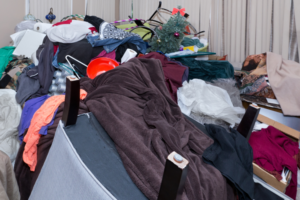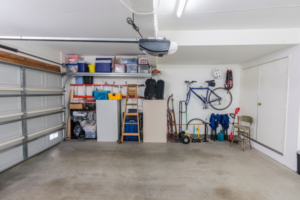Cleaning Up A Hoarding Situation
Thanks to popular TV shows like Hoarders, people are more aware of the prevalence of hoarding in our society. Have you recently recognized you or someone you know suffers from hoarding? If so, keep reading, this article is for you. We’ll explore the definition and signs of hoarding, as well as how to completely change and clean up a hoarded home and lifestyle.
What is Hoarding?
Hoarding refers to the act of accumulating things. Hoarding is commonly regarded as a behavior that manifests from anxiety or psychological trauma. Someone who hoards has an extremely hard time getting rid of, parting with, or discarding objects, regardless of value. A person’s hoarding habits are often kept as a secret because they feel shame for their behaviors and living situation.
Signs of a Hoarding
If you are worried that you or someone you know could be a hoarder, take a look at the following list. Some hallmark signs of hoarding and hoarding tendencies include:
- An inability to discard or part with objects
- Distress when discarding objects, even if they’re broken or incomplete
- An impulse to “save” objects from being discarded
- An obsession to stockpile items for fear of running out
- Holding on to unused or unusable items for sentimental purposes
- Filthy, cluttered, and inaccessible living spaces, including garages, cars, and yards
- Disorganized storage spaces, such as containers and rented units
- An inability to use living spaces due to clutter or filthiness
- Reclusive behaviors, leaving the house is emotionally taxing
- Shame or anxiety for having guests over
- Social anxiety, despite a desire to have guests over
The Difference Between Hoarding and Collecting
 Your or a loved one may feel defensive with the terms “hoarder.” Instead, the person in question may prefer to use the word “collector” to describe their obsession for acquiring items. Here is some information to distinguish the two terms from each other.
Your or a loved one may feel defensive with the terms “hoarder.” Instead, the person in question may prefer to use the word “collector” to describe their obsession for acquiring items. Here is some information to distinguish the two terms from each other.
According to the American Psychiatric Association, hoarding is characterized by an erratic, emotional, and spontaneous behavior of accumulating objects. Collecting, on the other hand, describes the accumulation of objects in a highly intentional and organized manner. Below are some notable differences between collectors and hoarders.
Collectors Vs Hoarders |
Collect items within a certain theme, such as stamps, cards, magnets. | Collect items with no regard to their classification. |
Acquire items carefully and selectively, usually after extensive research, thought, and budgeting. | Acquire items impulsively; this behavior may be compulsive. |
Arrange, display, and care for their items. | Tend to store, pile, and neglect their items. |
Can part with broken, unadmired, or unusable items. | Are unable to part with unusable or neglected items and experience distress when faced with this decision. |
Are You an Organized Hoarder?
People usually think of hoarders as indoor hermits trapped within dirty, mountains of clutter. The truth is, even seemingly clean and orderly people can be hoarders.
Like a collector, an organized hoarder is meticulous in the organization, display, and care of their items. Here are the signs to look out for if you suspect you or someone you know is an organized hoarder. An organized hoarder:
- Rarely uses their items, despite keeping their collection organized and tidy.
- Regularly purchases organization bins in which they store their items.
- Installs custom shelves, cabinetry, and the like to organize and store their items.
- Dedicates entire rooms to storing items, which they usually keep closed off.
- Pays for and fills storage units they never visit.
Factors That Contribute to Hoarding
Experts suspect hoarding has a psychological origin. It is believed that accumulation is a coping mechanism intended to comfort a hoarding person. Mental health issues, past trauma, and current stressors are all contributing factors of hoarding behaviors. These issues become more evident upon assessing a hoarding person’s reasons for hoarding.
Reasoning for Hoarding
A hoarder will have a never ending list of reasons why they acquire and hold on to objects. According to the Anxiety and Depression Association of America, the most common reasons why hoarders behave the way they do stem from powerfully held beliefs. Such beliefs include:
- A belief that a stored item will be needed in the future
- A belief that discarding a sentimental object discards the memory of a loved one
- A belief that bargains cannot be overlooked and passed up
- A belief that all sentimental items are irreplaceable or unique

These beliefs may baffle a non-hoarder. To a non-hoarder, almost everything is replaceable. But to a hoarder, almost all items have a powerful sentiment attached to them.
The strong emotional attachments a hoarder attributes to their collections (cluttered or organized) are enmeshed with their identity. Essentially, each item becomes an extension of the hoarder’s self-concept. A hoarder may feel lost, empty, anxious, or distressed at the thought of existing without their collection.
What Can You Do About Hoarding?
There is no one solution for overcoming hoarding; it requires a multi-faceted approach. Here are the things you or a loved one can do about hoarding, hoarding habits, and hoarded living spaces:
- Recognize your choice
- Create a plan
- Ask for help
- Hire a professional crew
- Seek counseling
- Be persistent, stay strong, and don’t give up
Recognize Your Choice
If you want to clean up your life from hoarding, you cannot wait and hope that things will get better. Unless there is a natural disaster like a flood, fire, or earthquake (in which the chances are very low), your situation won’t change unless you do.
When it comes to how you live your life, you have a choice. Your happiness and quality of life all depend on the choices you make in the present. You have the power within you to change your life any way you can. The first step to treating hoarding behavior is to be honest. You need to admit to yourself that there is a problem, as well as a need for change.
Create a Plan
Waste no time in getting started with the cleanup of your hoarding beliefs, behaviors, and living spaces. After recognizing the power you hold over your life, work quickly to create a plan of action. Follow the steps below to guide your clean up plan:
- Prepare to do everything at once. You do not have to declutter and clean your entire life in one day. This step instead means to prepare to declutter, discard, donate, sell, organize, and clean everything every day until you finish what you set out to do.
- Pick one object category at a time. It could be books, papers, clothes—anything. This step is intended to actively work against the hoarding tendency to collect a disarray of impertinent items together. Any collection of items are good to start with as long as they can be tackled in a coordinated fashion.
The goal of this step is to assess the items you own and determine their practical usefulness in your mind and living spaces. As you go through each category, sort “wanted” items from “needed” items. From the “needed” items, identify which items you realistically need based on their frequency of use throughout your daily life.
Once you’ve gone through the first category, pick another and resume your de-hoarding activities.
- Decide how you will get rid of the excess. You can sell, donate, consign, throw away, or give away your items. Only choose one or two methods. These methods should be motivating and easy to complete. For example, selling a large portion of items at a garage sale may be easy because shoppers come on their own. The profits made from selling items at a garage sale can also be motivating.
We suggest using social media wherever possible to ease your efforts. Use apps like Facebook, NextDoor, LetGo, and sites like eBay and Craigslist to advertise your items for sale or free.
Ask For Help
Change is hard enough on its own. Set yourself up for success by asking your social network for help and support during this transitory time in your life. There is no need to feel shame in asking for help. Your friends, neighbors, and co-workers will feel excited and inclined to help you because they know you are working to help yourself.
Letting others know about your decision to change can spur opportunities that can be unexpected, significant sources of help. You never know what others are willing and able to do for you.
Some may feel moved to clear our clutter from your home, and others may donate money for junk removal services or therapy. Still, some may volunteer their time and cars to transport donations, and others may help by being a source of emotional support and a shoulder to lean on.
Hire a Professional Crew
Once you and your social circle are ready to get to work, it’s time to hire some professionals. Enlist the services of cleaning, organizing, and junk removal experts.

After you identify the items you’ll keep, divide your professional crew work into a three-part strategy.
First, hire a junk removal team to load, haul, and dispose of the items and materials that will not be kept, sold, or donated. Some junk removal crews specialize in hoarding clean up.
Once the living spaces are cleared of clutter and bulky items, call in a cleaning crew to renew and refresh. Ask about tips and tools for keeping clean
When everything is decluttered and clean, book an appointment with a professional organizer. Lessons in keeping tidy.
Keep all these numbers and companies on hand for future reference and help.
Seek Counseling
Hoarding is a behavior that is learned and strengthened over time. Changing a behavior requires a change in lifestyle and mindset. Seek the guidance of a therapist to help you understand the origins and triggers that cause hoarding.
A therapist will help you discover the reason why you or a loved one struggles with hoarding objects. A therapist can help you throughout this discovery by:
- Listening to your thoughts and worries.
- Asking deep questions to uncover personal revelations.
- Framing your thoughts and situations from different perspectives.
- Propose personalized coping mechanisms.
- Be a source of support and accountability.
Be Persistent, Stay Strong, and Don’t Give Up
Cleaning up your home, mind, and life from the physical and mental clutter of hoarding doesn’t happen overnight. The transition from hoarder to non-hoarder is a gradual process that takes courage and perseverance every day.
Make yourself stay accountable towards your goals to clean up your life from hoarding with the steps above. When you feel weak or vulnerable, reach out to your friends, family, or a therapist. If you need extra help removing unnecessary items from your home, do not hesitate to make an appointment with a clean up crew.
Hoarding Clean Up Traps
Organizational consumerism makes it easy for recovering hoarders to regress. As you progress through your hoarding clean up journey, beware of these clean up pitfalls.
Refrain from renting storage units and buying storage containers. Do not allow yourself to set foot into an online or brick-and-mortar storage retailer. Climate-controlled rooms and matching storage containers look and sound nice, but they are merely a short-term solution that does more damage than help.
Hoarding Clean Up Resources
There are endless resources available to support you as you work to free yourself from clutter and hoarding habits.
For further reading, we suggest Marie Kondo’s The Life-Changing Magic of Tidying Up, as well as Fumio’s Sasaki’s Goodbye, Things. These books offer profound insights regarding what drives our desires to accumulate. You will also undergo a series of gentle lessons that teach you how to part with clutter, as well as exercises in staying tidy and organized.
 For an online source of support and community, we recommend watching Angela Brown’s Youtube series, #HoardingWorld. To participate in interactive discussions join the Hoarding subreddit. These resources are here to show that when it comes to hoarding, you are not alone.
For an online source of support and community, we recommend watching Angela Brown’s Youtube series, #HoardingWorld. To participate in interactive discussions join the Hoarding subreddit. These resources are here to show that when it comes to hoarding, you are not alone.
For a compassionate and convenient clean up crew, contact Argus Restoration Group. We will work quickly and thoroughly to restore your living space. Our expert team is dedicated to helping you live your best life, no matter what you’re going through.
Be Understanding Till the Very End
Be empathetic during this time; coming to terms with hoarding is not an easy thing to do. It takes courage and humility to take this first step. Don’t forget to take a moment to celebrate a new chapter in which you or your loved one bravely make a change for a better quality of life.

